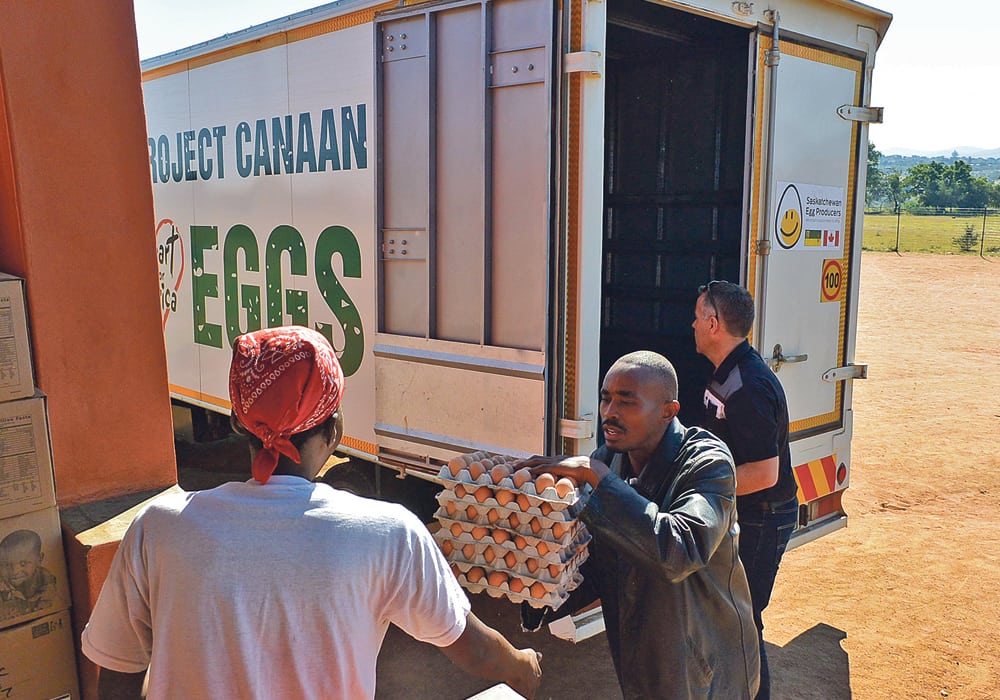The delivery truck bought by Saskatchewan Egg Producers is part of a larger humanitarian project on the continent
The lowly egg, high in vitamins and nutrients, is saving lives in Africa with help from Canadian farmers.
Undernourished children in Africa’s smallest country are better fed, thanks to Saskatchewan Egg Producers.
“The egg is an immediate source of great protein,” said Cam Broten, executive director for Saskatchewan Egg Producers.
“For many it’s a primary source of nutrition for the day. We know when they’re hard-boiled, they go straight into a child’s hand that’s going straight into their belly and straight into their body to help them grow.”
Read Also

AGCanadaTV: In case you missed it; your national ag news recap for Nov. 7, 2025
https://youtu.be/hDhaCHQRyso Carney government drops first federal budget The 2025 federal budget put a hefty focus on trade – particularly diversifying…
Earlier this year, the provincial organization bought an egg delivery vehicle in eSwatini, which until recently was known as Swaziland, bordering South Africa and Mozambique.
Geographically, it is one of the smallest of Africa’s developing countries yet its Swazi population faces major health issues with the highest HIV-AIDS rate in the world. More than 200,000 children are orphaned and about half of the total population are orphans and vulnerable people.
Recently, the country also faced the worst drought in its history, which has further increased food insecurity, as well as poverty and disease.
“For Saskatchewan egg farmers, it’s very important to give back. That means helping out here at home through foodbank donations and it means doing our part to support a brighter and healthier future in Swaziland,” said Shawn Harman, chair of the Saskatchewan Egg Producers.
The producer group is part of Egg Farmers of Canada, which is involved with the Heart for Africa Project Canaan. The nonprofit project created a sustainable farm and home to 191 orphaned and abandoned children in eSwatini.
In 2016, Egg Farmers of Canada helped establish an egg farm at Project Canaan to provide a high-quality source of protein and essential nutrients for the children’s home and surrounding communities.
The egg-laying operation has two barns that can each handle 2,500 pullets in their gravity-fed system.
“It’s been a project that the Canadian egg industry has adopted and put a lot of weight behind it in terms of providing technical expertise for how to develop the farm and how to do egg farming well,” said Broten.
He said there’s been a steady stream of Canadian egg farmers taking the time to travel to the farm and provide mentorship and coaching.
“They work with the employees doing the daily chores of feeding and caring for the birds, picking eggs and doing all those things. And so they have great training, high standards are being followed and the productivity and efficiency of the barns have continued to improve and to really serve the community and the project very well,” he said.
Purchasing the truck was an effort by the Saskatchewan Egg Producers to contribute more to the program.
“This truck greatly extends the reach of delivering the eggs as well as other food to surrounding communities all throughout the country,” he said.
Each day the Hino 300 truck and trailer with its 2.5 tonne payload delivers several thousand hardboiled eggs and Manna food packs to thousands of children and families in communities and rural homesteads throughout eSwatini.
Because of the lack of refrigeration in the country, eggs are treated in a process that preserves them within their shell as they are hardboiled.
Broten also gained a first-hand appreciation of the operation in action while travelling to eSwatini in June.
“I went with them on a delivery route and you’re going into quite remote locations. There’s some highway travel, but you’re dealing with a lot of wash out and really rough rocky conditions. The roads are not in a great shape,” he said.
One of the highlights for him came on a day when he helped make a delivery to a local family.
“We visited a homestead where there was a grandmother who was quite elderly. There was one other adult on site and about 11 or 12 children. We gave a few flats of hardboiled eggs and also a few flats of uncooked eggs for them to use in their own food production. The eggs were welcomed, like they were receiving the most wonderful gifts because to them it’s the ability to be fed, to have strength.
The total experience in eSwatini was a big eye-opener while adding perspective.
“When we realize how fortunate we are here in North America, in Canada, our farmers see that and they want to give back and this is one way that they’re tangibly able to do so. It’s hugely rewarding and makes you want to participate more,” he said.
You can find more information in the following video:
















